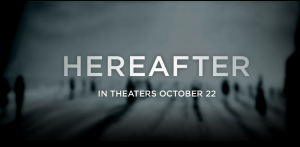 This Friday evening I will be accomplishing two things at the same time. I will be able to enjoy dinner and a movie with my wife, and prepare for my participation in a podcast with CineFantastique Online. I have been invited as a guest by CFQ to provide some thoughts on the movie HEREAFTER, which opens this Friday, October 22. Given that the subject matter deals with psychics, near-death experiences, and the question of life after death, I have been reviewing some of the information in my research files on the paranormal. In addition, I have read a few reviews of the film online. One in particular caught my attention, and I provide a few responsive thoughts below.
This Friday evening I will be accomplishing two things at the same time. I will be able to enjoy dinner and a movie with my wife, and prepare for my participation in a podcast with CineFantastique Online. I have been invited as a guest by CFQ to provide some thoughts on the movie HEREAFTER, which opens this Friday, October 22. Given that the subject matter deals with psychics, near-death experiences, and the question of life after death, I have been reviewing some of the information in my research files on the paranormal. In addition, I have read a few reviews of the film online. One in particular caught my attention, and I provide a few responsive thoughts below.
The piece is titled “‘A Life that’s All About Death’: A Review of Hereafter” by Gary Westfahl that appears in Locus Online, a publication devoted to science fiction and fantasy. Westfahl states at the outset that he is a fan of these genres, which makes sense writing for a publication like Locus Online. But he then goes on to take issue with Hereafter because it does not take the idea of life after death and tease it out for its possibilities. Westfahl rightly notes that science fiction and fantasy plays with the possibilities presented by alternative worlds and constructs of reality:
Among other things, science fiction and fantasy are all about world-building, using a fantastic idea to construct a fully-realized portrait of an alternative environment and the way of life it would engender. A science fiction or fantasy writer, pondering these accounts of the afterlife, would craft answers to various questions: precisely how are the consciousnesses of deceased people transferred to this new realm? What happens to them there? What are their new lives really like?
Since Hereafter does not do this, but is instead very reserved in its depiction of the afterlife and its application to the world of the living, Westfahl sees this as a shortcoming, and as a result he is less than pleased with Hereafter. But in my thinking this is an inappropriate imposition of genre and its expectations on this film. The film’s director, Clint Eastwood, has not made science fiction or fantasy films previously. His work is in the genre of drama, and therefore it is more natural to read Hereafter as an example of that genre that incorporates common ideas related to the psychic realm and the afterlife found in popular culture.
Westfahl’s attempts at reading Hereafter in light of science fiction and fantasy with its resulting disappointment is curious in that earlier in his review he writes that “my efforts to analyze Hereafter will necessarily be unable to contextualize the film as part of [Eastwood’s] vast and often admirable oeuvre…”. Although Westfahl states that he has not seen two of Eastwood’s more notable directorial efforts that exemplify his interest in drama, he was at least aware of the types of films that he has done, even though he was not able to interact with Hereafter within a broader cinematic context for the director. This general awareness of Eastwood’s tendency toward drama should have been sufficient to read Hereafter in its dramatic rather than fantastic context. I don’t know if Hereafter is a good film or not. I’ll form my opinions after I see it on its opening night. But Westfahl’s review serves as a reminder for film critics and general audience members not to impose genre expectations on a film, but to try to interpret it on its own merits within its genre conventions.
I will share further thoughts after I’ve had a chance to view the film at week’s end, and to reflect on it prior to my participation in the Cinefantastique Podcast Sunday afternoon. I’ll post a direct link to the discussion once it is uploaded at CFQ.





There are no responses yet